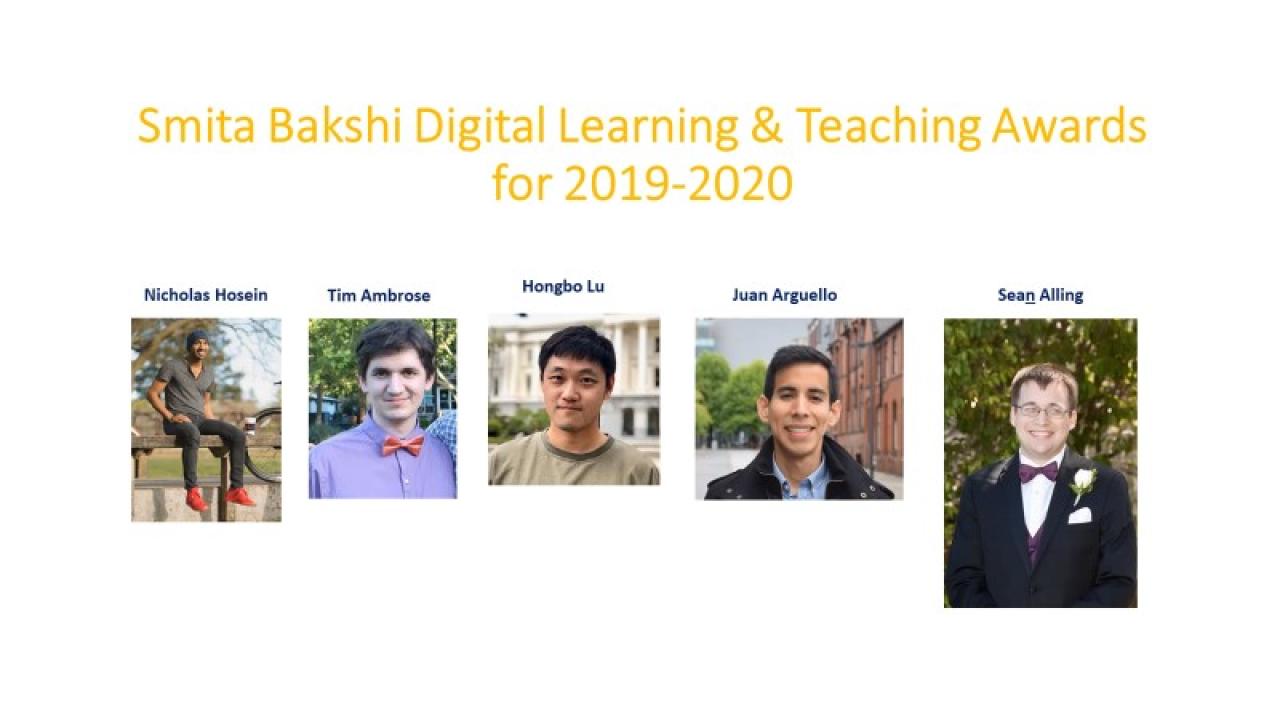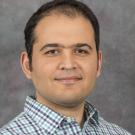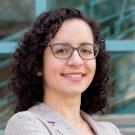
ECE Ph.D. Students Awarded Inaugural Smita Bakshi Digital Learning & Teaching Award for 2019-20
Please join us in congratulating this year’s inaugural recipients of the Smita Bakshi Digital Learning & Teaching Award! The Smita Bakshi Digital Learning & Teaching Award was given out to Juan Arguello, Sean Alling, Tim Ambrose, Hongbo Lu and Nicholas Hosein at the 2020 ECE Awards Ceremony on Friday, June 12.

Background
Dr. Smita Bakshi cofounded Zyante Inc. in 2012 to empower college students and other learners to acquire knowledge and skills in STEM disciplines with highly interactive learning material and teaching tools to make university instruction more effective and efficient. Zyante pioneered learning content that is interactive, created specifically for the modern web, with auto-grading that saves instructors time and leads to better-prepared students in class. Recently when Zyante was acquired by Wiley, the company was rebranded as zyBooks and Smita Bakshi is the President. Prior to zyBooks, Smita was an assistant professor at UC Davis in the Department of Electrical and Computer Engineering. She has also spent 10 years of her career in engineering, product management, and business development in the software industry.
In 2020, the Smita Bakshi Digital Learning & Teaching Award was established by donors as an annual award in ECE to recognize teaching assistants in the department who have made exceptional innovations in the use of technology or developed digital material to improve learning outcomes in the curriculum. The 2019-2020 awards specifically recognize contributions that positively impacted teaching during the pandemic time period.
The Awardees
Nicholas Hosein was the teaching assistant for EEC136AB. EEC136AB is a senior capstone design course focused on electronic projects. In EEC136AB, Nicholas created new learning and remote instruction schemes for students to excel despite the difficulties that COVID-19 presented. EEC 136AB course instructor, Professor Rajeevan Amirtharajah had this to say of Nic:
"Nic contributed greatly to a number of digital learning initiatives in the course. First, he created a revised set of tutorial videos to help students learn the new microcontroller used in the course. He also revised the PCB design tutorials to utilize the new department-standard Altium design suite. Nic pioneered the use of in-person and prerecorded remote lab checkoff in the Fall 2019 and Winter 2020 quarters, initially as a means of giving students more flexibility in scheduling their project work. This experience proved invaluable for the Spring 2020 quarter when the campus transitioned to remote instruction. Nic is currently developing parallel in-person and remote instruction curricula for EEC 136AB for the next academic year. His innovative ideas and dedication to creating new forms of instruction have helped students tremendously in these challenging times..."
Nic was also the teaching assistant for EEC10. EEC10 is a sophomore-level hands-on course in which students build analog and digital systems to implement a music-following robot. Nic used his extensive experience as a seasoned teaching assistant to facilitate remote instruction of EEC10. Course instructor, Professor Hooman Rashtian had this to say of Nic’s impact:
“… Nic is passionate about designing innovative teaching techniques for project-based courses and as part of his Ph.D. thesis, he has been working on studying the effectiveness of a collaboration-based learning environment in which students learn to be self-sufficient in finding the answers to their questions and teaching what they learn to their peers. … Given the limited TA resources that we had for online delivery of the labs, this approach was an immense help in successful implementation of the online labs of EEC 10 ...”
Nic is currently pursuing his Ph.D. in Electrical and Computer Engineering. His research focuses on the effectiveness of a collaboration based learning environment, in which students learn to be self-sufficient in finding answers to their questions.
Tim Ambrose was the teaching assistant for EEC10. As previously mentioned, EEC10 is a sophomore-level hands-on course in which students build analog and digital systems to implement a music-following robot. Tim facilitated the successful operations of the remote labs for the course during the COVID-19 pandemic. Professor Hooman Rashtian comments:
“Tim performed a spectacular job in arranging shipment of the lab kits to students, recording tutorial videos for students, managing the Aggie Video channel of the course, preparing and sharing shopping carts of lab parts for students, creating a virtual machine with Windows OS and all the software needed in the course for students with Mac laptops, holding frequent Zoom office hours, giving timely responses to students’ queries, etc. … He always takes the initiative to help students and has shown that he is truly enthusiastic about teaching and mentoring younger students.”
Tim is currently pursuing his Ph.D. in Electrical and Computer Engineering. His research focuses on robotics, sensor networks, and distributed computing with retired smartphones and tablets.
Hongbo Lu was a teaching assistant for EEC135, an upper division senior course for optical networks. Hongbo easily adapted and facilitated instruction for students to be successful during COVID-19. Professor Marina Radulaski had this to say of Hongbo’s impact:
“Hongbo Lu has been an indispensable TA for the online transition, quickly grasping the concepts of the new type of instruction and going a step beyond, synthesizing student experiences and providing new types of instruction material. Hongbo … initiated a new module based on his insights from the office hours. To provide both peer learning and personalized instruction, EEC135 incorporated group problem solving in Zoom breakout rooms of 4 students. … Moreover, for students who are not able to attend the discussion session live, Hongbo provided ongoing online support until they master the problem.
Honbgo is currently pursuing his PhD in Electrical and Computer Engineering. His research focuses on an energy-efficient throughput-elastic radio access network using advanced photonic technologies for millimeter wave communication in 5G and beyond-5G system.
Juan Arguello was a teaching assistant for Engineering 6, a course that introduces first year students to the fundamentals of procedural programming, medical analysis, as well as elementary concepts of object-oriented programming, graphical user interfaces, and data visualization. Juan facilitated remote instruction via tutorial videos he created for the course, in response to the challenges that COVID-19 presented. Course instructor Professor Diego Yankelevich had this to say of Juan’s achievements:
“Juan volunteered to produce a series of videos to teach the students how to develop graphical user interfaces, use tools for data sharing in the cloud and others for ordinary tasks. The videos stood out for covering the essence of the information we needed to convey, the eloquence of the narration, their deliberate pace and diction.”
Juan is currently pursuing a Ph.D. student in Electrical and Computer Engineering. His research focuses on wireless power transfer and designing wireless powered sensors embedded in materials such as metals, composite materials, and implants in the human body.
Sean Alling was the teaching assistant for EEC105A/B/C, also known as EE-Emerge. EE-Emerge is a yearlong course to engage electrical and computer engineering juniors and sophomores to promote engineering to the public, and in particular K-12 students by the use of interactive electronic exhibits conceived and built by the EE-Emerge students. Sean provided students with online sources to create their best projects, assisted in mailing parts for projects, and was also readily available to troubleshoot issues for students via Slack, GitHub, or Zoom. A student in the class commented:
“Knowing that constructing a project with remote instruction would be difficult, Sean helped our team in any way possible. He provided us with numerous resources such as websites and other online sources that would help us develop our website, find parts we needed, and guide us through any problems we encountered. He also made himself available for virtual office hours during a time that worked for each team and was very responsive in Slack. Sean cares about his students and wants to see them grow and succeed. He's very willing to share his knowledge in order to help others.”
Sean received both of his undergraduate and master’s degrees from UC Davis, and is currently pursuing his Ph.D. in Electrical and Computer Engineering. His research is in power electronics and power electronics control systems.
Please join us once more in congratulating this year’s inaugural recipients of the Smita Bakshi Digital Learning & Teaching Award!
Written by Jide Akinmoladun and Department Chair, André Knoesen





